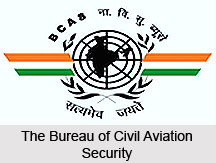 The Bureau of Civil Aviation Security was initially established, as a Cell in the Directorate General of Civil Aviation (DGCA) in January 1978 on the suggestion of the Pande Committee constituted as a reaction of the hijacking of the Indian Airlines flight on 10th September 1976. The role of the Bureau of Civil Aviation Security was to coordinate, monitor, inspect and train personnel in Civil Aviation Security matters.
The Bureau of Civil Aviation Security was initially established, as a Cell in the Directorate General of Civil Aviation (DGCA) in January 1978 on the suggestion of the Pande Committee constituted as a reaction of the hijacking of the Indian Airlines flight on 10th September 1976. The role of the Bureau of Civil Aviation Security was to coordinate, monitor, inspect and train personnel in Civil Aviation Security matters.
Bureau of Civil Aviation Security, also known as the BCAS was reorganized into an independent department on 1st April, 1987 under the supervision of Ministry of Civil Aviation as a partner to the Kanishka Tragedy in June1985. The main responsibility of BCAS are to create the standards and measures in respect of security of civil flights at International and domestic airports all across in India. Bureau of Civil Aviation Security is the authoritarian unit for civil aviation security in India. It is controlled by an officer of the rank of Director General of Police and is designated as Commissioner of Security.
Bureau of Civil Aviation Security is the major authority for implementation of Annexure 17 to Chicago convention of International civil aviation organization (ICAO) and also develops implements and maintains the National Civil Aviation Security Programme. The headquarters of Bureau of Civil Aviation Security is located at Janpath Bhavan in New Delhi. It has got four Regional Offices that are located at International airports i.e. Delhi, Mumbai, Kolkata and Chennai. An officer of the rank of Deputy Commissioner of Security (CA) heads the Regional Office.
The organization lays down the Aviation Security Standards according to the Annex 17 to Chicago Convention of ICAO for airport operators, airlines operators, and their security agencies, which are responsible for implementing AVSEC measures. Monitoring the implementation of security rules and regulations and carrying out survey of security needs is another aspect that Bureau of Civil Aviation Security looks into. The officials of this organization ensure that the persons implementing security controls are properly trained and possess all levels of competencies that are required to perform their duties. Planning and coordinating the Aviation security matters and conducting dummy checks to test professional efficiency and alertness of security staff is also regularly done by the Bureau of Civil Aviation Security. Mock exercise to test effectiveness of Contingency Plans and operational awareness of the aviation groups are particularly conducted by this unit.






